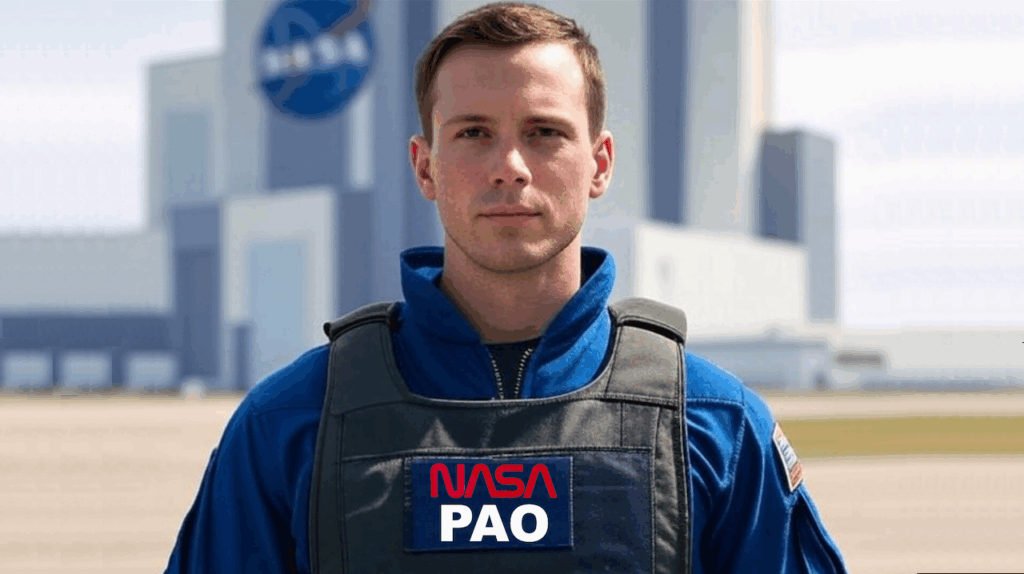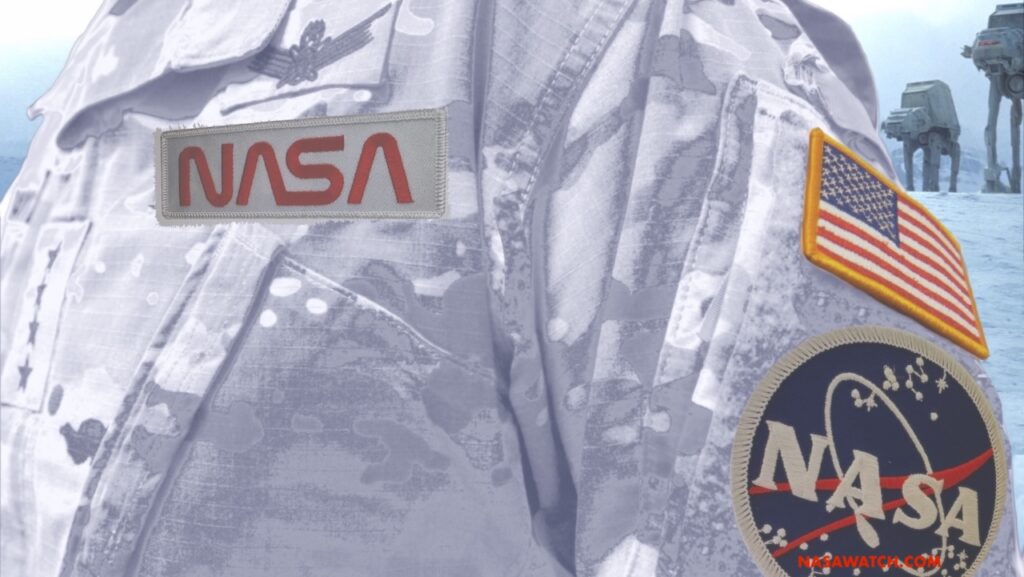Space Force Wants To Dominate Everything In Space

Space Force releases 1st doctrine, defines “spacepower” as distinct form of military power
“The Space Capstone Publication explains why spacepower is a vital element of U.S. prosperity and security – now and in the future – and guides its employment in multidomain operations. As the USSF continues to grow and mature, we will continue to evolve our doctrine to stay on the cutting edge of defending our interests in space.”
Space Capstone Publication, Spacepower (SCP)
“Military space forces must be responsible stewards of the space domain. When designing missions, training, and performing end of life operations, military space forces should make every effort to promote responsible norms of behavior that perpetuate space as a safe and open environment in accordance with the Laws of Armed Conflict, the Outer Space Treaty, and international law, as well as U.S. Government and DoD policy. Just like all forms of warfare, the prosecution of space warfare and the potential generation of collateral damage is judged against the principles of military necessity, distinction, and proportionality. Through this approach, military space forces balance our responsibilities for operational readiness with the safety and sustainability of the space environment for use by future generations.”
“Space professionals recognize the independent impact spacepower has on National prosperity. Our global persistence postures the Joint Force to continuously assure Allies, deter aggression, coerce competitors, and defeat adversaries. We provide the enduring vigilance that protects the United States and our Allies from strategic surprise. Due to this global persistence and enduring vigilance, space professionals are perfectly postured to provide the Joint Force global, and not just regional, perspective and capabilities. As we look to the future, our orbital presence must secure the ever expanding frontier of U.S. space interests. At their most fundamental level, space professionals seek to protect our Nation’s prosperity and security.”
 Keith’s note: It is quite obvious from this document that the current Administration’s space focus is the undisputed leadership and control of all aspects of space via military means. All other uses – scientific, exploration, humanitarian, commercial, societal – are of secondary importance to the mastery of space that the Space Force seeks to impose. Indeed the authors overtly talk about the need to “coerce competitors”. Competition – whether it be commercial or governmental – when peaceful – is supposed to be good, right? These Space Force guys simply want to bend others to their will.
Keith’s note: It is quite obvious from this document that the current Administration’s space focus is the undisputed leadership and control of all aspects of space via military means. All other uses – scientific, exploration, humanitarian, commercial, societal – are of secondary importance to the mastery of space that the Space Force seeks to impose. Indeed the authors overtly talk about the need to “coerce competitors”. Competition – whether it be commercial or governmental – when peaceful – is supposed to be good, right? These Space Force guys simply want to bend others to their will.
FYI “NASA” appears only once in this document – at the end – in the credits on page 61 where it says “Cover Image courtesy of NASA”. The face that America’s civilian space agency is literally a footnote to this other American space policy speaks volumes in terms of where the main focus is.
To be certain we have had space-based defense assets for more than a half century that need to be secured. But It seems to have escaped the notice of all of the would-be space warriors that imposing an enhanced military mindset upon all American space activities is the best way to push other nations to do the same. Curiously, we have had a continuous human presence on ISS for 20 years with Russia – one of our prime terrestrial politcal adversaries. If you include the Shuttle-Mir project then this continuos cooperation goes back to 1993 between the US and the USSR. We seem to get along vastly better in space than we do on Earth. Certainly there are lessons to be learned from this experience. Reading this document, you get the exact opposite impression: the ISS is not even mentioned.
Just as we are pushing for an overt increase in the militarization of space many in NASA are endorsing a push to get the International Space Station awarded the Nobel Peace Prize. The policy disconnect between pursuing the peaceful and military uses of space could not be more profound.
– The Space Force Squad Wants To Create Problems – Not Avoid Them, earlier post
– Now Space Force Wants Its Own Starfleet Admirals, earlier post- Space Force Official Flag Presented To The President On Friday Because Of Course It Was, earlier post
– Space Force Has The Air Force Academy. Why Doesn’t NASA Have A Space Academy?, earlier post
– More Space Force postings







I don’t recall the Latin phrase, but in English: “If you would have peace, prepare for war!” What this doctrine is stating is no difference from our strategic defense policies here on Earth. Having the capability to fight against our potential adversaries does NOT mean we are going to initiate hostilities. But considering the activities in space of certain other countries…the Chinese destruction of one of their own defunct satellites and the Russian’s checking out one of our observation satellites in Earth orbit, having the capabilities to deter hostile intent certainly seems to make sense. As to not mentioning NASA except in passing, that is to be expected as NASA is, by its charter, a civilian agency with little to no military objectives.
The objective of deterrence is to be strong enough or stronger than potential adversaries, so that EVERYONE keeps their hands off the keys/buttons/triggers.
There is another reason why the Space Force wouldn’t say much (or anything) about NASA. NASA spacecraft are not a likely target. It looks like the Space Force considers protecting assets in space to be a major part of their mission. Which makes sense. But country trying to disable another country’s spacecraft would face very serious, negative foreign (and media) reactions. They wouldn’t do that unless disabling such a spacecraft benefited them in some way. I can see how disabling communications, GPS or surveillance satellites might make them worth the repercussions. That makes them potential targets and something the Space Force has cause to worry about. But NASA spacecraft? How would disabling Hubble help any other country? They would get a huge backlash from the rest of the world in return for accomplishing nothing which benefited themselves. The same thing it true of other NASA spacecraft: Although the backlash wouldn’t be a great, it wouldn’t benefit the hostile nation an any way I can think of. So no hostile nation is likely to target NASA spacecraft, and therefore the Space Force really doesn’t need to worry about protecting NASA spacecraft.
As an historical example, during the Cold War, the US and the Soviet Union had scientific bases in Antarctica and regularly exchanged scientists between those bases. Even during the the worst parts of the Cold War, like the Cuban Missile Crisis, the Navy didn’t have any concerns about Russian attacks on US stations in Antarctica. That would have been both weird and pointless, and the Navy had more probable concerns to worry about. So, if, in 1962, the Navy wrote a report about how to protect American interests, I really doubt they would have mentioned scientific stations in Antarctica. The same logic applies to the Space Force today and NASA spacecraft.
The introduction to Chapter 2 sums it up:
“Access to space is essential to U.S. prosperity and security — it is a national imperative. The many benefits our Nation derives from space include mass communications, financial and economic information networks, public safety, weather monitoring, and military technology. Like any source of national power, the United States must cultivate, develop, and protect these benefits in order to secure continued prosperity”
Si vis pacem, para bellum
~~ Publius Flavius Vegetius Renatus, De Re Militari
I have a feeling a lot of changes are coming under President Biden.
But he won’t change this. The USSF was created on bipartisan initiative in Congress.
Keith’s note seems to object to any strong statement about what the military will do in Space. The Policy focuses on the military, not NASA. NASA *should* be a footnote in military policy, or there would be substantial reason for complaint that the Space Force was trying to take over NASA!
Further, NASA’s scientific and technical development activities are *not*nearly* a congruent set with those needed for Space Force. While I am still digesting the document, I notice the simple point that USSF intends to focus on *military* objectives, which, IMHO, is good. Having Space Force, at this early date, begin talking mostly about all the non-military scientific and other activities in Space would be worrisome. It would lack the view of focused attention on the next 10 years of military competition that actually started in 2005, when China began preparing their first anti-satellite test, that we saw in 2007. It would lack a focus that accounts for the institutional focus commenced in 2015, with the stand up of PLASSF. I have held such views since I finally gave up hope for markets reforming Chinese society in 2008, when a Chinese gentleman I was holding an internet conversation with openly sneered at “America’s religious fetish with individual freedom”.
The document cannot please everyone, …and does not try. Objecting to Space Force not coordinating with internal NASA groups attempting to get a Peace Prize for ISS *does* indicate the basic objection, so far. That academics, with their own objectives, were not consulted.
We will be seeing that more and more in coming decades. In 1965, in my first summer on a college campus, I remarked in a campus conversation, that summer, “people seem to, want to remake society into one large college campus”, … and got the reply “sure, …what’s wrong with that??” For decades since then, *that*expectation*, that the University system and its highly certified graduates have the *right* to be consulted has been growing, because they held some optimal model of society.
That expectation is collapsing. Here in the Portland area, where a progressive Republican did as much as possible to push that expectation through funding Universities, right through the time when he was Chair of the Senate Appropriations Committee, instead of Senator Shelby, that expectation has turned into outright demands. But whether it is the Streets of Portland, or 10th floor of NASA HQ, those demands are less and less listened to. Given that they will be less often listened to, a new policy and strategy for advancing Space research will have to be built. Mere referral to status gained in University will not help much at all.
The Space Force people go on and on about protecting things but never mention exactly what it is they are seeking to protect or who owns the things they want to protect. As for your dislike fo academics – well, that is your problem. And BTW NASA’s 10th floor is called a “roof”.
Well, since the Russians and others have actively tested offensive capabilities against our national satellites, that would seem to answer that.
I wonder if, like relying on NASA for the photo credit in their advertising brochure, will Space Force rely on NASA for some of it’s expertise in developing space systems?
The Air Force has had its own space systems for over 60 years now. Of course there has always been some interplay between NASA and DOD.
I haven’t yet read the whole document, but nothing you mention is significantly different from what the Air Force has said going back several administrations.
Personally, I am fascinated by the evolving perspective of the USSF towards its domain and mission. This is probably similar to what happened starting in 1947 when the USAF was established, however, because of the information age, we are all spectators to the inner workings of this process.
Well, the point of military strategy is to dominate the battlespace. If you don’t have that as a goal, you’re going to lose the fight, no matter if it’s on land, air, sea, space or cyber.
Pentagon officially releases UFO videos
https://www.cnn.com/2020/04…
Pentagon UFO unit to publicly release some findings
https://nypost.com/2020/07/…
Man ever since the Pentagon released the UFO vids it has been nothing but Space Force! …
Now are they simply a false flag so they can get more funding, or has it finally come to the point we have to acknowledge the galaxy is swimming in life.
It’s ironic that General of the Army Dwight D. Eisenhower/President Eisenhower specifically and pointedly decided in 1958 that militarization of outer space would not occur in the U.S. He gave the responsibility for manned spaceflight to the civilian agency he created–NASA. That ended the squabbling among the military services for battle platforms in LEO and missile launch sites on the Moon.
Now that idiot in the White House wants to undermine this setup with his Space Force nonsense. I expect that will change within the next year when he is replaced and the new president junks SF.
“It’s ironic that General of the Army Dwight D. Eisenhower/President Eisenhower specifically and pointedly decided in 1958 that militarization of outer space would not occur in the U.S.”
Ummmm, …., Note that Eisenhower did this as a civilian *political* move, to take the air out of then Senate Majority Leader Lyndon Baines Johnson’s plans to use a “struggle” for NASA, as a major part of his internal campaign within the Democratic Party to get the Party’s nomination in 1960. Approving NASA rapidly was a good political judo move in the continual interplay of politics that LBJ was a master of within the Senate, that denied LBJ the nomination, … barely. It was LBJ’s staff that wrote the first draft of the NASA Charter, however.
There were several reasons for Eisenhower to not add a new military Service at that time. One was in the Farewell Speech he began writing that summer, the Military Industrial Congressional Complex, of which Johnson was the primary congressional exemplar in the late 1950s. Unfortunately, when the Kennedy Mafia saw the speech, they edited out the first “C” in MICC, because that would have pointed too directly back at their own new Vice President, sitting on the same platform behind Eisenhower. That change has, ever since then, allowed the press to scream about Congress’ vassal corporations, while ignoring those with the power to allocate the funding. Allocation done too often based on whose district would be getting more money to keep voters voting for incumbents.
Note also that it was the Eisenhower Administration that funded and launched the first military application for spaceflight, in beginning the Transit series of satellites that were to help the Polaris Submarine Fleet navigate more precisely. Yet, they knew that assigning all of MilSpace to any single existing Service would provoke immense suspicion in the other Services, because the strategic reconnassance capability from orbit would be used to set budget priorities as well, …which is why what became NRO was created. Unfortunately, NRO then became so firmly welded into the workings of Beltway politics during the next 10 years that any natural growth of NRO into a Space Force Service was aborted.
There has been a distinct separation between America’s military and civilian space efforts for over half a century. Whatever Eisenhower did – for whatever reason – everyone since then has agreed – until now.
“Whatever Eisenhower did – for whatever reason – everyone since then has agreed – until now.”
Actually, … not *everyone*, … just a majority of those with the power to make their wishes felt. While it was a *good* political judo move, it has had substantive costs over the decades. Those are illustrated today in the difference between the MilSpace agency costs that make programs 5-10 times more costly than market rates, even while NASA programs’ agency costs are illustrated by the 50/1 difference between first flight costs for Falcon Heavy and SLS. Neither is the fault of government agencies themselves, … still, Congress feels freer to gorge with NASA.
Both General Medaris, from the Army Ballistic Missile Agency, and General Schreiver, from the Air Force, were quite open, after retirement, as is proper, about this. Many agreed with them. Books were written mentioning this, such as Medaris’ “Countdown for Decision”, sitting within sight on my bookshelf.
Indeed, this separation of military and civilian spaceflight is *not* being questioned today, in starting a Space Force Service. In fact, as I noted elsewhere, it would be taken as a discursive distraction from Space Force’s military focus if they started fiddling with civilian government spaceflight to any great extent.
That’s a somewhat inaccurate summary of Eisenhower’s goals for creating a civilian space agency. He was very actively pushing his Open Skies policy, which would allow US surveillance aircraft to overfly the Soviet Union (and vice versa). The Soviets didn’t care for that idea at all, but a Soviet satellite overflying the whole world weakened their position. For that reason, Eisenhower very definitely did not want the first US satellite to be a military one. That’s why he made sure both NASA and the first US satellite would be civilian. He didn’t object to US military satellites. He just wanted the precedent of overflight set in a way which would be hard to contest. Which meant being set by US civilian satellite or, as it happened, a Soviet satellite. So the whole Eisenhower policy towards a civilian space agency had a large (perhaps primary) goal of geopolitical arm twisting to legitimize military surveillance.
What you say is true about Eisenhower and military spysats. I was remarking specifically on Space Force, which, as I understand it, wants its own manned spaceflight capability separate from NASA. I just pointed out how completely Ike shut that down in 1958.
” … which, as I understand it, wants its own manned spaceflight capability separate from NASA.”
Then you understand wrongly. US Space Force is in existence to ensure the continuation and growth of the MilSpace “force multipliers” of our Sea, Air, and Land forces. It may well be that as the ability to threaten those assets from the Earth’s surface grows (think large ASAT lasers on the ground), then those assets may have to be moved to far higher orbits. That would mean larger apertures than can be lifted from Earth’s surface for reconnaissance, communications, and possibly navigation satellites as well. That, in turn, would mean assembly in Space, at altitudes similar to eventual deployment.
*That* may mean we may see deployment of Space Force personnel, …not in “Tie Fighters”, … but for final assembly and deployment of the many future MilSpace assets with aperture diameters far above 100 meters, at altitudes from 200,000Km and further out from Earth. Think of the personnel on the Navy’s Fleet Oilers, rather than Naval Aviators in fighter jets.
Ike shut that military participation in the rest of spaceflight down to avoid interservice conflicts, and to avoid the exploitation of it all by Congress members like LBJ. He partitioned the small portion of science and exploration work off in NASA, just as LBJ asked for, but sooner than LBJ wanted. Then, the Kennedy Administration blew that small portion substantially larger.
Dude. Just look at the advertisements that Space Force pouts out. Lots of pictures of astronauts in space. They even co-opted an on-orbit NASA event with military astronauts in space.
“Just look at the advertisements that Space Force pouts out.”
Yes, …look at the ads, and remember their purpose. That being recruitment.
Can you remember a single recruitment ad, for *any* military Service, that expresses the old universal description of a military career, … that being “years of utter boredom and sweat, punctuated by minutes of utter terror”, … can you? They leave it to the DI and his Corporals, to express the one truth about military conflict the recruit has to know, “The more you sweat in Peace, the less you bleed in War.”
You’ll never see that sort of recruitment ad, and neither will I. The fact that they used the only images we have of US citizens in Space in a spacesuit is hardly remarkable. When they have their own people helping in assembling 1,000 meter transmitter arrays for powersats to beam down power to drones above a battlefield, *then* they’ll use their own images. Until then, they’ll use whatever is available.
NASA is a government hierarchy, not a sacred trust never to be associated with that closest simulation possible, to Hell-on-Earth, that is War. NASA’s images are *not* icons, but tools. For a while, Space Force will use them.
They did events live in space with astronauts. Your comments are starting to border on being loony. You made your point.
USAF advertisements from the 1950’s also featured astronauts in space and many USAF pilots from that era went on to serve at NASA as astronauts. Several joined the USAF because they dreamed of flying into space. Indeed the Apollo 11 mission had two of them on board. I expect it’s only a matter of time before USSF personnel serve as NASA astronauts.
Just another income source for big defense to get paid.
Hate to break bad news to you, Keith, but all ships rise with the tide.
Of course, there is always the standard story trope that we see of scientists standing on the moral high-ground that science and technology can be had without the guilt of their research being used someday to kill people. However, that is only possible in fiction. Such chest-thumping reflects an illusion of control that scientists have never had over the current funding or future direction of their discoveries. So, if a scientist wants to do work that will never dove-tail into the military, then they need to deliberately limit their studies to the mating habits of tree frogs because any other advanced technology always, eventually, becomes indistinguishable from a bigger gun because both swords and plowshares are beat out by the same blacksmiths.
In short…Bob is an active duty Colonel and Doug is an active-duty Colonel. Military folks who become astronauts are allowed to keep and continue their current status as military officers. Why is that do you suppose? This is why I always get a good laugh whenever I hear somebody whine about another country (like China for example) hiding military advancement behind space research. The procurement network between NASA and the Air Force have always been functionally indistinguishable…so therefore is the connection between space technology and military technology. Heck, even Jeff Bezos and Elon Musk are out there right now rubbing elbows with generals.
On top of all of that, peaceful Government funding of space transportation technologies is always subject to political upheaval, but throughout the back and forth power struggles between Democrats and Republicans, the military momentum of advancement marches on behind the scenes, making progress in the violent applications for space tech far more stable than in the peaceful ones.
The ISS is peaceful cooperation because it is peaceful cooperation…not because it is in space. Both us and Russia have been trying to leverage that cooperation politically here on the ground until it has now become frayed and is now about to break. I too watched “Capitol to Capitol” and loved it. I like that soviet ICBM engines have been purchased by us for our own rockets for so many years, but all of it still springs from two seperate people and governments who are still rivals.